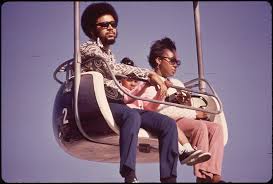The American middle class is thinner and grayer than it used to be and that’s not just due to the Great Recession. The trend lines have been headed in that direction for decades. Thomas Piketty has suggested that the green shoots of widespread prosperity, like the period the U.S. enjoyed in the aftermath of WWII, are more exception than rule. But belief in the American Dream, that those who work hard will be rewarded, is difficult to shake no matter what the numbers say, and many still vote their aspirations rather than their actuality, which can lead to policy mismatched to reality. From Dionne Searcey and Robert Gebeloff at the New York Times:
The middle class that President Obama identified in his State of the Union speech last week as the foundation of the American economy has been shrinking for almost half a century.
In the late 1960s, more than half of the households in the United States were squarely in the middle, earning, in today’s dollars, $35,000 to $100,000 a year. Few people noticed or cared as the size of that group began to fall, because the shift was primarily caused by more Americans climbing the economic ladder into upper-income brackets.
But since 2000, the middle-class share of households has continued to narrow, the main reason being that more people have fallen to the bottom. At the same time, fewer of those in this group fit the traditional image of a married couple with children at home, a gap increasingly filled by the elderly.
This social upheaval helps explain why the president focused on reviving the middle class, offering a raft of proposals squarely aimed at concerns like paying for a college education, taking parental leave, affording child care and buying a home. …
According to a New York Times poll in December, 60 percent of people who call themselves middle class think that if they work hard they will get rich. But the evidence suggests that goal is increasingly out of reach. When middle class people look up, they see the rich getting richer while they spin their wheels.
“The middle has basically stayed the same; it hasn’t improved,” said Lawrence F. Katz, an economist at Harvard University. “You’ve got an iPhone now and a better TV, but your median income hasn’t changed. What’s really changed is the penthouse has become supernice.”•

